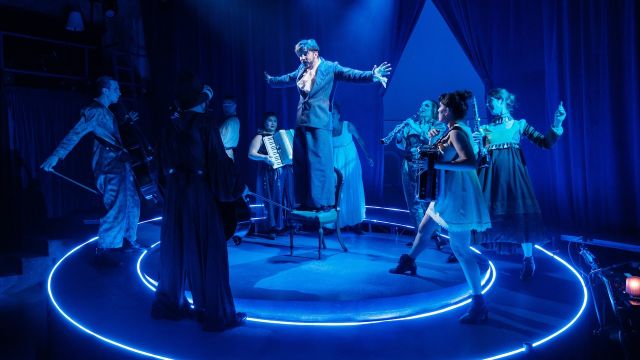Natasha, Pierre & The Great Comet of 1812
Inspired by a slim slice of Tolstoy’s epic War and Peace (the 70-page Part 8), immersive, quirky Natasha, Pierre & The Great Comet of 1812, dubbed an “electro-pop opera”, envelops the Eternity Playhouse and its audience.
As immersive as you can get without a re-build, Director Dean Drieberg and set designer Tyler Hawkins have turned the Eternity Playhouse into a highly theatrical circus/sideshow-like playground for this rambunctious, playful romp, the arena equally inventively lit by Veronique Benett. Costuming by Nicol & Ford mixes quasi-period with twists.
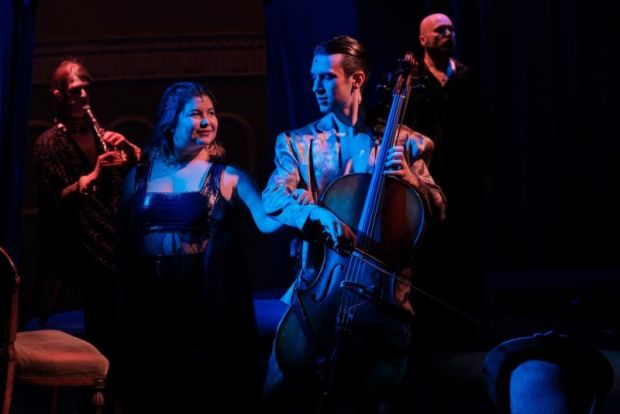
Dave Malloy’s quirky score hooked me the first time I played the Broadway recording, with influences like Russian folk music, pure rock, Broadway and even Weimar cabaret undertones taking it way beyond electro-pop, into a far more eclectic hybrid.
Like Once, also seen at this theatre, the talented ensemble company add an additional ‘threat’ to the usual triple, accompanying themselves on instruments ranging through piano accordions, keyboards, drums, cellos, guitars, woodwind, and … a triangle – often while simultaneously rampant with Brendan Yeates’ energetic, quirky choreography.
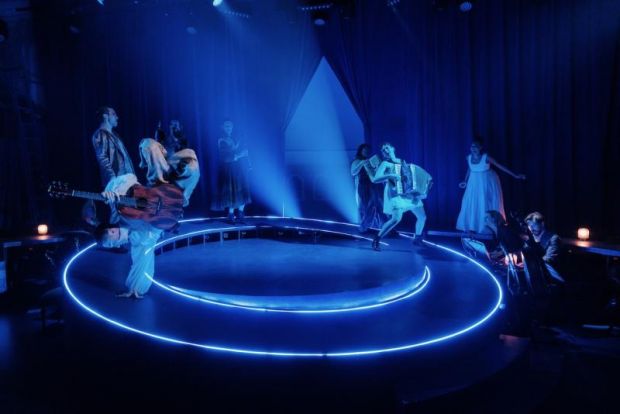
Plot knowledge is an advantage ahead of seeing this show. Sure, the frenetic opening introduces everyone, but it’s a lot of information to absorb at speed. Foyer murmurs about difficulties following the plot, and the associated challenges in identifying and empathizing with the characters, made me glad I’d cheated and listened to the cast recording in advance, while following the lyrics.
So, here’s my potted version.
Moscow, 1812. As the Napoleonic War rages elsewhere, unhappily married Pierre (Zoy Frangos) broods. Natasha (Grace Driscoll), engaged to Pierre’s friend Andrey (P. Tucker-Horley), absent fighting, arrives with her cousin and confidante Sonya (Kala Gare), staying with her aunt, Marya (Jillian O’Dowd).
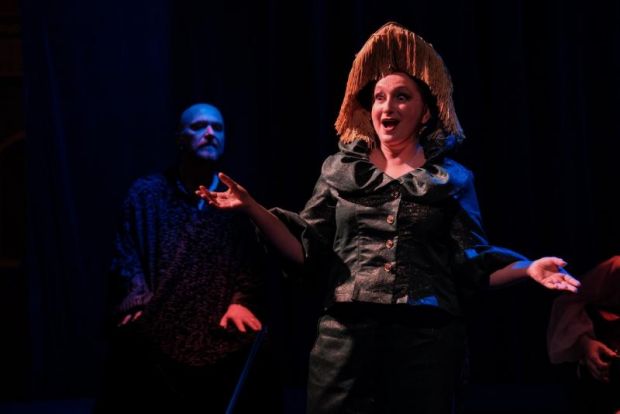
Waiting to be re-united with her beloved, Natasha has a bizarrely dreadful meeting with his solitary sister, Mary (Lilian Hearn), and extremely odd father, Prince Bolkonsky (P. Tucker-Horley).
At an opera performance, Natasha attracts the attention of notorious married libertine Anatole (Jules Pendrith) - also Pierre’s brother-in-law. The opera pastiche – great fun from the first time I heard it on the cast recording – is an absolute hoot, as staged here, and, way less reverent than a Lloyd Webber send-up.
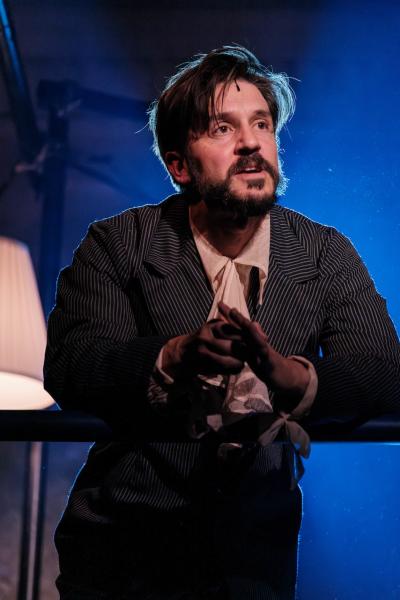
After the opera, Anatole, his friend Fedya (Cameron Bajraktarevic-Hayward) and Pierre are out drinking. They meet Pierre’s flirtatious wife Hélène (Marissa Soroca). Despite the unhappiness of his marriage, Fedya’s suggestive toast impugning their honour goads drunken Pierre into a duel. Miraculously Pierre wins, injuring Fedya.
Anatole persuades Hélène to invite Natasha to a ball she is hosting that night, where he seduces her. Natasha subsequently breaks off her engagement, scandalously planning to elope with Anatole, unaware that he is married.
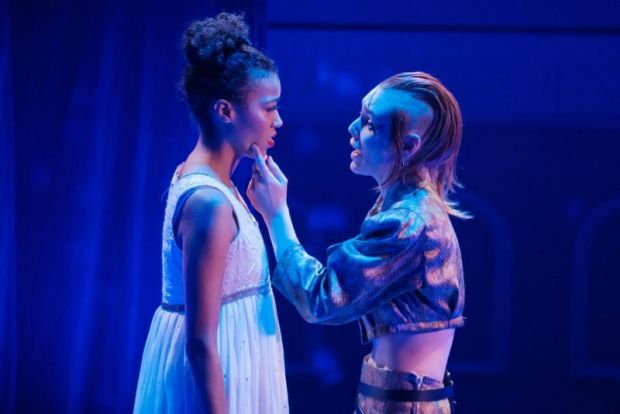
After Pierre eventually persuades Anatole to break off their plans and leave Moscow, Natasha attempts to suicide. Andrey returns, telling Pierre that he cannot forgive Natasha. In perhaps the show’s most touching moment, Pierre comforts Natasha in “Pierre & Natasha”, as both find paths forward, and that Great Comet of 1812 appears.
Zoy Frangos nails a jaded rocker disillusionment of Pierre, juxtaposed with the quiet, intense sincerity of the show’s final moments. With delightful organic unity in vocals and acting, Grace Driscoll’s Natasha is a performance of range, from optimistic naivety, through heartbreak and desperation, to vulnerability and emerging hope in those final moments with Pierre.
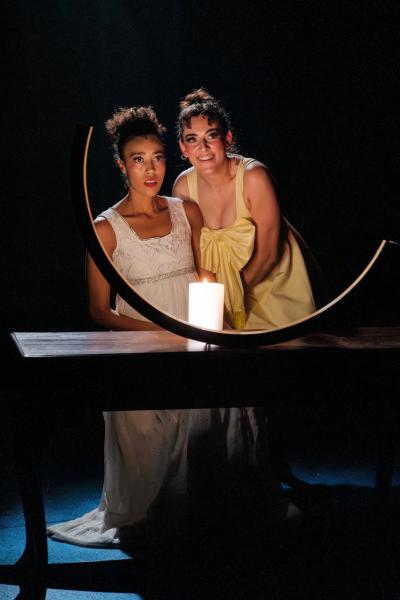
Kala Gare’s warm mezzo as Natasha’s cousin Sonya ensures the credibility of her steadfast confidante relationship throughout. Jillian O’Dowd is comical and imposing as matriarch Marya. Manipulated like a grotesque human puppet, P. Tucker-Horley’s Prince Bolkonsky is a suitably obnoxious, absurdly comical cameo. Flirtatious, earthy, and mostly just in search of a good time, Marissa Soroca’s Hélène makes it eminently clear that there are two sides to the bad marriage.
Full of swagger, though, Jules Pendrith’s notorious lothario Anatole is a joy; the vain, arrogant peacock we should love to hate - but sometimes you’ve got to just love the baddie. Attitude and astonishing vocal range make this portrayal an outrageous highlight.
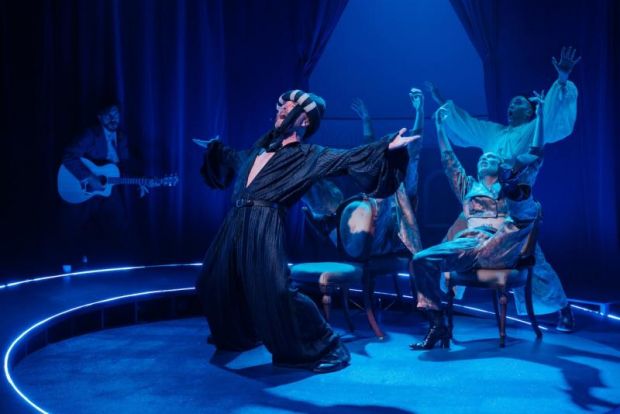
The sound mix, from rambunctious rock concert to gentle intimacy, must be a challenge, especially with singer / musicians moving around the theatre – it’s a challenge well met by Dylan Robinson. Pulling the music together under extreme circumstances like this, across various corners of the theatre, Musical Director Claire Healy deserves huge kudos.
The joy of this evening at the Eternity Playhouse right now probably lies more in the fun of the boisterous, high-octane production, and the effervescent multi-talented company than the show itself. Natasha, Pierre & The Great Comet of 1812 isn’t a GP blockbuster, but it certainly has great potential to become a cult favourite art-house musical. Playing about 10 months on Broadway, after picking up just two of the twelve Tony Awards it was nominated for (Scenic and Lighting Design – both of which are also fabulous in this version), the intimacy of this Sydney production is far more in tune with its hit Off-Broadway roots than that larger scale incarnation.
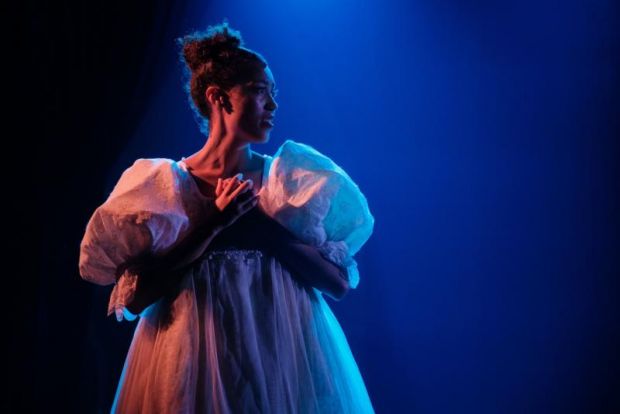
Personally, I had great fun, encircled by such terrific local talent throughout this musical theatre romp.
Neil Litchfield
Photographer: Robert Catto
Subscribe to our E-Newsletter, buy our latest print edition or find a Performing Arts book at Book Nook.

